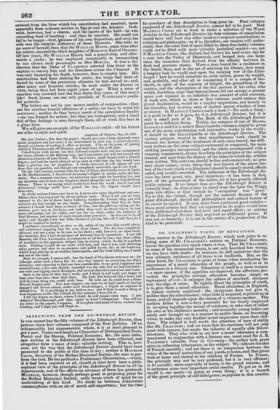DR. CHALMERS'S VIEWS OF EDUCATION.
Tins answer to the Edinburgh Review, which took pains in re- futing some of Dr. CHALMERS'S notions on Political Economy, leaves the question very much where it was. That Dr.CHALMERS, in some of his economical tenets, is not only heretical but wrong, we can have little doubt: for instance, he still maintains that the true ultimate incidence of all taxes is on landlords. But, on the other hand, Dr. CHALMERS is quite at home when inculcating the importance of a moral education of the people, as well as or in preference to a literary one. Education in itself is a mere weapon —a mere means : if the appetites are depraved, the affections per- verted, the principles corrupt, education becomes simply an instrument of evil—it enlarges the sphere of mischief, sharpens only the edge of crime. To rightly direct the principles of youth, is to give them a moral education. Moral education, in England, is almost entirely neglected : the clergyman does not give it, neither does the schoolmaster; what little is acquired, is picked up at home, and all depends upon the charm of a virtuous mother. The modern father is now-a-days generally far too busily employed in scrapinep together the means of existence, to take care of either his own or his children's morality; and assuredly young ladies are rarely now brought up in a manner to enable them, on becoming wives, to make any very decided moral impression upon their chil- dren. The subject is well worth the attention of men of ability -like Dr. CHA.LBIERS; and we trust that his exertions will not only meet with success, but excite the industry of equally able fellows labourers. They who wish to see how a moral education is com- municated in conjunction with a literary one, must read Sir A. B. FALANER'S valuable Tour in Germany; the author took great pains in collecting information on the subject. We ridicule the idea of French morality; and yet there is no comparison between. the value of the moral instruction of our youth,.at home, and that given both at home and abroad to the children of France. In France, the principle may not be very profound, but it is very efficient: to be amiable, more especially at home' -is. the grand maxim; and it embraces some very important social results. To get on in the world is our motto—to grasp at every thing: it is a branch of the great principle of self-indulgence,-so popular in this country.




















 Previous page
Previous page